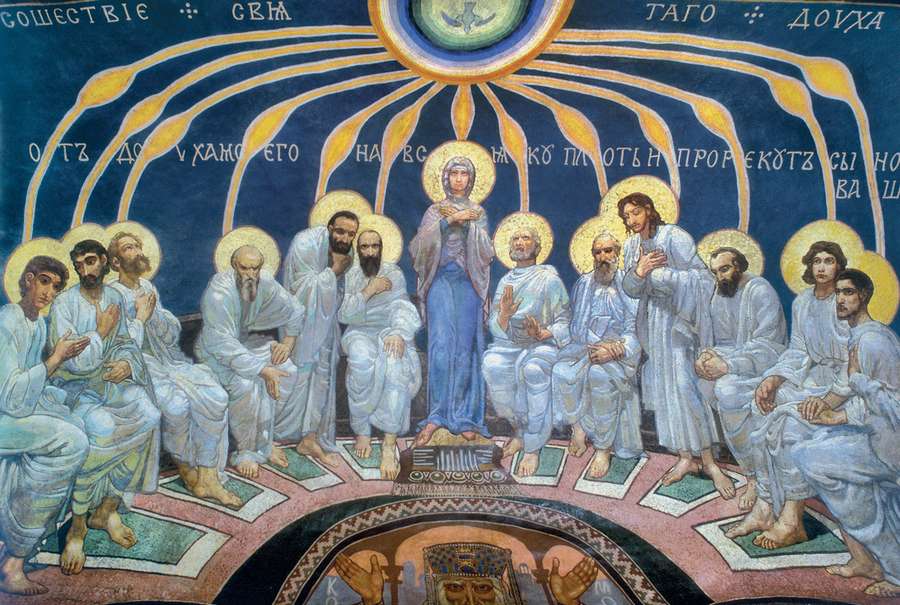

From: Genesis 11:1-9
Babel: the confusion of language
*********************************************************************************************
Commentary:
11:1-9. The text goes on to describe the growth of evil (cf. 8:21; 9:20-27), and,
as one of its results, the fact that mankind is scattered and its God-given unity is
fragmented. Thus, the text begins by talking about mankind when it was still toge-
ther; it came from the east, where it originated and settled in the plains of Meso-
potamia (in Shinar; cf. 10:10). But the people are filled with pride, and want to
make a name for themselves, and to guarantee their own security by reaching
heaven by their own efforts. This attitude is epitomized by the project of building
a massive tower (we can get some idea of it from the tower-temples of Mesopota-
mia, the ziggurats, on whose high terraces the Babylonians thought they could
gain access to the godhead and thus dominate God).
The text also offers an explanation for why there are so many languages; it sees
language as a sign of division and misunderstanding between individuals and na-
tions. It is based on the popular meaning of the word “babel”, connecting it with
the Hebrew balbalah, confusion; but in fact Babel means “gate of God”. We have
here an instance of literary devices being used to expound deep convictions – in
this case the view that disunion in mankind is the outcome of men’s pride and
sinfulness.
Babel thus becomes the opposite of Jerusalem, the city to which, the prophets
say, all the nations will flock (cf. Is 2:2-3). And it will be in the Church, the new
Jerusalem, that men of all nations, races and tongues will join in faith and love,
as will be seen in the Pentecost event (cf. Acts 2:1-13). There the phenomenon
of Babel will be reversed: all will understand the same language. In the history
of mankind, in effect, the Church is a kind of sign or sacrament of the union of
God and men, and of the unity of the whole human race (cf. Vatican II, “Lumen
Gentium”, 1).
11:4. St Augustine explains the frustration of man’s designs against God in this
way: “Where would man’s vain presumption have ended if it succeeded in rearing
a building of such size and height, even to the sky in the face of God – since
they would have been higher than any mountain and would have reached beyond
the limits of our atmosphere? In any case, no harm could have come to God from
any straining after spiritual or physical elevation” (”De civitate Dei”, 16, 4).
This new sin of mankind is basically the same sort of sin as was committed in
paradise; it is a kind of continuation of it. It is the sin of pride to which man is
always prone and it has been well described in the following words of St. Jose-
maria Escriva when he comments on 1 John 2:16: “The eyes of our soul grow
dull. Reason proclaims itself sufficient to understand everything, without the aid
of God. This is a subtle temptation, which hides behind the power of our intellect,
given by our Father God to man so that he might know and love him freely. Se-
duced by this temptation, the human mind appoints itself the centre of the uni-
verse, being thrilled with the prospect that ‘you shall be like gods’ (cf. Gen 3:5).
So, filled with love for itself, it turns its back on the love of God. In this way does
our existence fall prey unconditionally to the third enemy: pride of life. It’s not
merely a question of passing thoughts of vanity or self-love, it’s a state of gene-
ral conceit. Let’s not deceive ourselves, for this is the worst of all evils, the root
of every false step. The fight against pride has to be a constant battle, to such
an extent that someone once said that pride only disappears twenty-four hours
after a person dies. It is the arrogance of the Pharisee whom God cannot trans-
form because he finds in him the obstacle of self-sufficiency. It is the haughti-
ness which leads to despising other people, to lording it over them, and so mis-
treating them. For ‘when pride comes, then comes disgrace’ (Prov 11:2)”
(”Christ Is Passing By”, 6)
*********************************************************************************************
Source: “The Navarre Bible: Text and Commentaries”. Biblical text from the
Revised Standard Version and New Vulgate. Commentaries by members of
the Faculty of Theology, University of Navarre, Spain.
Published by Four Courts Press, Kill Lane, Blackrock, Co. Dublin, Ireland, and
by Scepter Publishers in the United States.